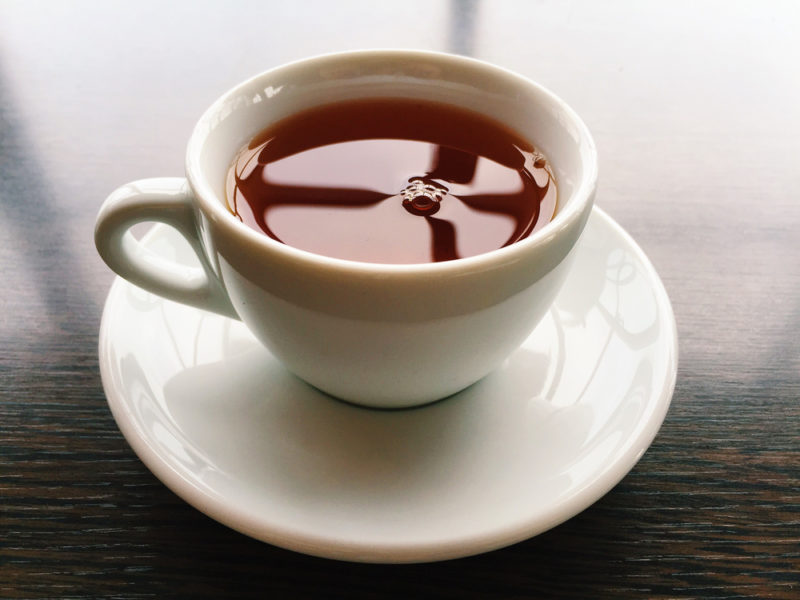
Tea is the most consumed beverage in the world after water and with over 3,000 varieties of teas to choose from, the possibilities are endless. Whether you are looking to curl up on a cool night with a warm cup of tea, need an extra boost of energy, or are simply looking to improve your health, be sure to take advantage of the soul warming benefits from your favorite teas, one sip at a time.
Whether you are stressed from busy schedules or battling the sniffles, the following teas can be used to warm the body and soul! For an added bonus, reuse your tea bags for an instant do-it-yourself eye treatment.
4 Health Benefits of Tea
It’s hydrating, it’s social, it warms the soul; tea is something that can benefit you, your health, and those who you share it with.
1. Digestive Support
It is no coincidence that our parents brought us a warm cup of tea when we weren’t feeling our best, to soothe upset tummies and bring comfort. Whether due to stress or the flu, tea can bring comfort to a stomach that is upset.
A warming cup of tea to start the day can also have other benefits. Warm water at the first part of the day lubricates the digestive system and can help prepare the body for breaking down food more effectively. Water in general also stimulates peristalsis, which is what moves food through the digestive tract. (1)
2. Antioxidant support
Many of the health benefits associated with tea can be attributed to their polyphenol and phytochemical properties. Polyphenols are plant compounds that act as antioxidants, helping to prevent cellular damage. Tea leaves also contain polyphenol oxidase enzymes, tannins, anthocyanins, and catechins, all of which are part of a larger class of antioxidant compounds. Tea is high in oxygen radical absorbance capacity (ORAC), which is a posh way of saying it helps to destroy and fight free radicals. (2)
3. Cardiovascular Health
Tea has many cardioprotective properties, such as its antioxidant, polyphenolic, and phytochemical compounds. These plant compounds can help protect against cardiovascular disease through their ability to promote endothelial function. This is important because the endothelium refers to a layer of cells that line the inside of blood vessels and lymphatic vessels. The health of the endothelium cells is vital as they deal with circulation and blood flow throughout the body.
Research has suggested that drinking as little as one cup of tea per day can support healthy arterial function. (3) Drinking tea can be beneficial due to improved vasodilator function of the arteries, specifically the coronary arteries. (4)
4. Cognitive Support
Recent research from the American Journal of Clinical Nutrition found that drinking tea not only improved attention, but also allowed individuals to be more focused. The role of tea in strengthening attention and providing mood support lies in the combination of theanine and caffeine. Specifically, the amino acid theanine, combined with the caffeine found in black, green, and white tea, contributes to many of its benefits. (5)
15 Healthy Teas You Should Be Drinking
While there are hundreds are varieties of teas available, these 15 stand out from the crowd for having exceptional health and wellness benefits.
1. Black Tea

Black tea comes from a shrub called Camellia Sinesis and is made through a process of rolling, heating, and fermenting the leaves. Black tea is abundant in antioxidants, such as flavonoids and polyphenols, as well as tannins that have beneficial effects on digestive and intestinal health.
The tannins found in black tea can also provide immune support. The amino acid l-theanine, which can be found in black tea, promotes relaxation and focus.
A compound in black tea called TF-2 causes certain cancer cells in the stomach, prostate, and breast to go into apoptosis, or programmed cell death. Polyphenols in black tea have also been shown to prevent the formation of potential carcinogens in the body, particularly in certain types of cancer, such as ovarian, lung, prostate, colorectal, and bladder.
The tannins in black tea have a therapeutic effect on gastric and intestinal illnesses, making it a great digestive aid. These tannins act as natural antibiotics, preventing bacteria that lead to tooth decay.
To get the maximum benefits from black tea, let it steep for a full 15 minutes. This releases a good amount of tannins and ensures you’re getting the most out of your tea. (6) Get creative with black tea and add a dash of cinnamon or some stevia for an extra sweet treat without the additional calories.
2. Matcha
Matcha is a concentrated form of green tea which takes the tea leaves and grinds them into an ultra-fine powder. Matcha contains a higher concentrations of vitamins such as C, B, E, and K as well as chlorophyll, a very effective detoxifier that can aid in the elimination of unwanted toxins, chemicals, and heavy metals.
Matcha also contains l-theanine, an amino acid which can lead to a state of relaxed alertness and increased levels of dopamine and GABA. Matcha contains up to five times as much L-theanine as regular green tea.
Matcha also contains a specific antioxidant known as catechin. The catechins in matcha have been shown to promote phases 1 and 2 detoxification in the liver by activating enzymes, such as glutathione S-transferase and quinone reductase. Matcha is more catechin-dense than other green teas, containing as much as 137 times more than plain green tea. (7,8)
3. White Tea
The history of white tea dates back to the Chinese empire where white tea leaves were presented as a tribute to the emperor. White tea originates from China from the Camellia Sinensis plant. Its leaves and buds are left to dry out in the sun while the plant grows, and then are prematurely harvested to prevent oxidation, which preserves the subtle flavor and aroma.
White tea inhibits the growth of pathogenic bacteria, viruses, and fungi in the body, specifically with bacteria that cause staph infections, strep throat, and pneumonia. Antioxidants in white tea have also been found to fight free radical damage, and naturally support detoxification pathways in the body. (9)
4. Green Tea

Since ancient times, green tea has been considered by Traditional Chinese Medicine as a healthful beverage. It is known for its role in increasing fat oxidation, inhibiting fat cell development, and boosting metabolism. The active compound found in green tea, EGCG, supports the production of the hormone noradrenaline, which increases fat-burning and modulates fat absorption and metabolism.
Green tea is also loaded with antioxidants and plant compounds such as polyphenols, catechins, and flavonoids, which are known for their anti-aging and immune supporting benefits. This low caffeine tea is a great option for those looking to get a mellow energy lifeline, without the addictive jitters that coffee provides. Drinking green tea may also contribute to a reduction in the risk of cardiovascular disease and some forms of cancer, as well as the provide neuroprotective and bone-mineral density properties. (10)
5. Herbal Tea
Herbal teas are a group of their own with many wonderful health benefits. Herbal teas are great for supporting mental, physical, and emotional health, and can provide support to the immune system, the digestive tract, and lymphatic system, while also promoting feelings of tranquility and calmness. Certain herbal teas, like raspberry, can even tone the uterus in late pregnancy to prepare for labor, as well as ease symptoms of PMS or hormone imbalance.
Herbal teas are actually an infusion of leaves, seeds, roots, and/or bark that have been extracted to form a tea blend. Some common favorites include spearmint, raspberry, honeysuckle, ginger, elderberry, rooibos, lemon balm, and milk thistle. Many herbal teas have overlapping health benefits with the individual teas listed here, or can be found in tea blends.
6. Chamomile
Chamomile, which means “ground apple,” has been used for centuries as an herbal sleep aid. It is most popular in tea form and has a mild soothing effect, which can help induce sleepiness and reduces restlessness. It also has a positive effect on digestion.
One study found that drinking chamomile tea raised urine levels of glycine, a calming neurotransmitter used in the body. Chamomile has also been used to treat stomach ailments, as it can help to soothe and relax the muscles and lining of the intestines. (11)
7. Peppermint

Peppermint tea is one of the classics, known for its soothing taste and ability to settle the stomach. Peppermint isn’t only good for nausea, but can also be used to help support digestive issues. This is because it promotes bile flow and helps to relax the stomach and intestinal muscles. Peppermint tea is also contains trace amounts of calcium, vitamin B, and potassium. (12)
As with all teas, it’s best to choose an organic version, so that the nutrients are left in tact and not contaminated with extra pesticides.
8. Gotu Kola Leaf
Popular in Ayurvedic medicine, gotu kola tea is used to keep the mind and senses alert. This tropical plant is a member of the parsley family, and is often referred to as a brain tonic.
Gotu kola tea can be used to support memory, combat mental fatigue, and promote restful sleep. It has also been used to support the adrenal glands, helping to combat stress and energize the central nervous system. It can even reportedly increase libido. (13)
9. Tulsi Holy Basil
A member of the mint family, holy basil, also known as Tulsi, is one of the most revered plants in India. Its dual ability to act as an adaptogen herb and antioxidant tea allows holy basil to offer a host of benefits to the entire body.
Extremely popular in Ayurveda, holy basil does a great job of helping the body adapt to stressors, provide immune support, and bring balance to the central nervous system. Tulsi’s adaptogenic properties also help to balance hormones, especially the stress hormone cortisol, by supporting the adrenal glands. (14)
10. Chrysanthemum
Popular in Chinese and Japanese traditional medicine, chrysanthemum is a flower that offers more than just beauty for the eye. Chrysanthemums are rich in flavonoids and contain many vitamins and minerals including vitamins C and A, niacin, folic acid, magnesium, iron, potassium, and phosphorus.
Chrysanthemum tea helps promote healthy circulation and has a calming effect on the body. It can also help support normal immunity, and can have a cooling effect on the body, which is great for times of illness or hormone chaos. (15)
11. Lavender

Lavender is widely used for aromatherapy stress relief and is known for its relaxation properties. Lavender tea taken internally can provide mood support and have a calming effect on the mind and body, helping ease into a relaxed state.
Lavender tea is also a great bedtime tea as an alternative to chamomile. While some may not prefer its distinctive taste, it can be combined with lemon for a fruity blend that, when paired with a little raw honey, has a pleasing taste. (16)
12. Fennel
Fennel tea has a celery-like taste that has been said to help with stomach and intestinal issues, primarily those associated with digestive discomfort.
Fennel tea is made from crushed or ground fennel seeds, which contain essential oil compounds that are responsible for their muscle soothing and immune supporting properties. Fennel tea can be used to help to relax the muscles of the gastrointestinal tract and reduces intestinal cramping and pain. (17)
Because of its potent taste, sometimes compared to the distinct flavor of licorice, it’s best paired with peppermint or another strongly flavored tea to help temper the flavor.
13. Valerian
A popular Ayurvedic herb, Valerian root has traditionally been used to help people with insomnia and is even referred to as “nature’s valium.” Valerian is useful for easing nervous tension, muscle tension, and even anxiety.
Stronger than chamomile and not to be combined with other sleep aids, valerian tea is best used for difficulty falling asleep. It can also reduce night time wake-ups. (18)
14. Yerba Mate
Upgrade your Monday and caffeine game with this energy swap. Yerba mate was called “the drink of the gods” by indigenous South Americans and is said to have the strength of coffee, the health benefits of tea, and the euphoria of chocolate. In fact, yerba mate has about 90 percent more antioxidants than green tea.
Yerba mate contains xanthines, which are plant compounds that act as natural stimulants. They are also found in coffee and chocolate, and are known for their anti-inflammatory and antioxidant properties.
Yerba mate also offers digestive benefits and can increase the production of bile and gastric acids. It is also full of health-promoting phytonutrients such as tannins, trace minerals, chlorophyll, flavonoids, and even 15 different amino acids! (19)
15. California Poppy

You don’t have to live on the west coast to sip on this calming tea! While it is native to California, California poppy is known for promoting sleep, inducing relaxation, and easing mild anxiety.
Due to its antispasmodic properties, California poppy has also been found useful in relieving acute nerve and muscular pain. It can also naturally calm anxiety, reduce insomnia, and ease overall nervous energy. (20)
Bottom Line
Teas of all kinds can have wide-reaching health benefits that go well beyond drinking for enjoyment. Whatever your taste preferences, there’s a tea for you, and exploring the health benefits can take your natural Paleo diet to the next level.
